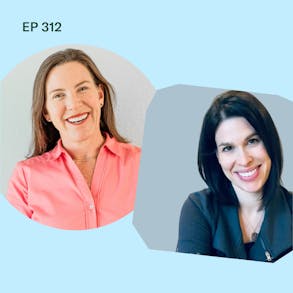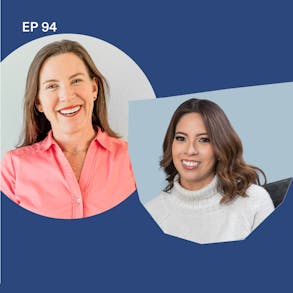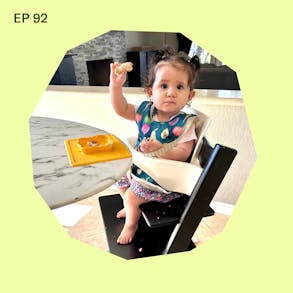3 Easy Responsive Feeding Techniques when Starting Solid Foods with Stephanie Cohen, MA, CCC-SLP, CLC
In this episode we're talking about:
- HOW to read baby's cues and follow their lead…even when you're tempted to pressure feed
- WHY we need to step back and support our baby's autonomy as they learn to self-feed
- WHAT emotional support at mealtimes looks like…it's easier to do than you think!

LISTEN TO THIS EPISODE
Episode Description
How good are you at reading your baby’s hunger and fullness cues? Do you observe your baby at mealtimes or are you pressuring baby to eat? In this episode my guest Stephanie Cohen, MA, CCC-SLP, CLC is sharing 3 easy techniques we can all start using at mealtimes to ensure we are being responsive feeders.
About the Guest
- Stephanie Cohen, MA, CCC-SLP, CLC is a speech language pathologist, feeding therapist and lactation counselor

- Stephanie works in private practice in the Chicago area and also with Marsha Dunn Klein’s Get Permission Institute
- She is passionate about helping children 0-3 with feeding challenges and is an Early Intervention evaluator

Links from this Episode
- Follow Stephanie on Instagram @learntotalkwithme and TikTok @learntotalkwithme
- Chicago Feeding Group’s Responsive Feeding Young Children: https://chicagofeedinggroup.org/get-responsive-feeding-fact-sheet/
- Baby-Led Weaning with Katie Ferraro program with the 100 First Foods™ Daily Meal Plan, join here: https://babyledweaning.co/program
- Baby-Led Weaning for Beginners free online workshop with 100 First Foods™ list to all attendees, register here: https://babyledweaning.co/baby-led-weaning-for-beginners
Other Episode Related to This Topic:
Episode 310 - Healthy Bottle Feeding: How to Be Responsive with Alison Ventura, PhD

Latest Episodes






Stephanie Cohen (56s):
As parents or caregivers, we're responsible for when we offer opportunities to eat and what we choose to offer and children are responsible for if they're going to eat, what they're going to choose and how much. So I think if we're thinking about the opposite of that, right, it's an adult taking over the child's responsibilities, determining what they're going to eat, how much they're going to eat, trying to get them to eat more or differently or less of certain Foods, trying to pressure them to do the things that we think they should be doing instead of tuning into them observing, understanding what they're communicating to us about their experiences and what they're intrinsically motivated to try and learn.
Katie Ferraro (1m 43s):
Hey there. I'm Katie Ferraro, registered dietitian, college nutrition professor and mom of seven specializing in baby-led weaning here on the Baby-Led Weaning Made Easy Podcast I help you strip out all of the noise and nonsense about feeding, leaving you with the confidence and knowledge you need to give your baby a safe start to solid foods using baby-led weaning. Well, hello and welcome back. My guest today is Stephanie Cohen, a speech language pathologist, Feeding therapist, and lactation counselor. Stephanie was on the podcast a little while back teaching us about picky eating prevention tips. We kind of in that interview started down a side tangent about the role of Responsive Feeding Techniques in the transition to Solid Foods, and I wanted to ever come back and talk a little bit more about that because there's so much research in Cheddar about Responsive bottle Feeding.
Katie Ferraro (2m 31s):
We actually just covered that on the podcast a few episodes ago, but too often the Responsive piece gets like dropped at six months of age. Like why are we so inclined to hear about the benefits of watching for your baby's cues during breastfeeding or early bottle feeding? But then when we start Solid Foods, like the default is to strip away your baby's autonomy and that that autonomy that they've been showing you, and we now want to help the baby direct their food intake, but instead, parents shove arbitrary amounts of gross period food down the baby's throat. Throat. So like where are we going wrong here? Stephanie and I are both working in our respective areas for her, that speech language pathology for me as a dietitian and nutrition, we're both mutually interested in this idea of extending the Responsive Feeding message that's so prevalent in the first six months of life.
Katie Ferraro (3m 13s):
We wanna push that into the second half of infancy, which is when your baby starts Solid Foods. And it's so important and it's the underlying kind of the underpin basically of baby-led weaning is that your baby is the one leading the way. Okay, we can get out of our baby's way, let them do the thing that they're designed to do. So in this interview, Stephanie is going to be sharing three easy Responsive Feeding Techniques that you can use to spot check whether or not you are being a Responsive individual, as the facilitator of this whole Solid food transition thing with your baby. Ultimately your baby's in charge, and Stephanie's gonna walk us through what it means to be a Responsive feeder in the Solid food space. So with no further ado, here is Stephanie Cohen teaching about three easy Responsive Feeding Techniques for you and your baby when you're starting Solid Foods.
Stephanie Cohen (3m 57s):
Hey Katie, I'm so happy to be here again.
Katie Ferraro (3m 59s):
AlRight, before we dive into some Responsive Feeding tips, share with me what are you working on these days? What's really exciting you right now?
Stephanie Cohen (4m 5s):
Oh my gosh, so many things. So I am one of the founding board members of the Chicago Feeding Group, which is a 501(c)(3) nonprofit. And one of our most important goals as an organization is to work on access to support for children with Feeding challenges and their families through early intervention programs around the country. So in the last year, we've developed this wonderful educational workshop that we're offering to program administrators starting here in Chicagoland and hoping to expand around the country. Just helping folks understand the importance of mealtimes and the impact of Feeding challenges on family life and early intervention is all about supporting children in their natural environment, helping to make family routines daily routines easier.
Stephanie Cohen (4m 53s):
And as you and I know children eat eight, 10 times a day and infancy five to eight times a day in toddlerhood, so, so what I'm really excited about is that we're starting to have an impact in helping folks see that they really can make a difference in a family's life by just understanding that we can offer early and high quality support through early intervention programs.
Katie Ferraro (5m 15s):
I love that. And we recently did an episode on Responsive bottle Feeding. We had Allison Ventura who's a PhD researcher from Cal Poly San Luis Obispo. She does a lot of work with WIC and their Responsive Feeding initiatives here in California. What I was hoping for in this episode, could you kind of extend this idea of Responsive Feeding? Like how does that apply in the latter half of infancy, like when families are starting Solid Foods with Babies, like how do you define Responsive Feeding? What is it?
Stephanie Cohen (5m 38s):
So we know that in infancy, we're talking a lot about reading cues, right, and following baby's lead, and it really is no different as infants grow. The major shift though is that infants are starting to become more independent. They're starting to build skills, they're starting to be able to do it themselves, and as they grow into toddlers, their drive for independence and autonomy becomes even stronger. So as parents, hopefully we're Responsive parents and we're noticing what our children are communicating to us and we're supporting autonomy. And in my mind, this just gets more pervasive in toddlerhood.
Stephanie Cohen (6m 18s):
There are more opportunities for infants and toddlers to be independent and learn new skills and maybe do it wrong and maybe figure out how to do it more efficiently and discover what they like, discover what they enjoy. So there are just more opportunities to notice what our children are communicating verbally and non-verbally about their experiences and their preferences and their interests, and they're building just a wider skillset as they learn to use their hands in different ways. They explore utensils, they explore cups and straws. So it's just more and more and more indifferent.
Katie Ferraro (6m 52s):
So I know we were talking before the recording, like the whole idea of Responsive Feeding, this is really nothing new. It's been in the literature, it's been evidence based and supported for many years. But like, thankfully, I think it's being picked up more in the mainstream, but to our audience, the term even Responsive Feeding is likely very new to a lot of listeners. So I wanna ask your opinion, what's the opposite of Responsive? Feeding? Like what do we not wanna do when it comes to starting Solid Foods, if we in turn do want to be Responsive in nature with our Babies?
Stephanie Cohen (7m 18s):
So I go back to the idea of the division of responsibility, which I know you've talked a lot about on different episodes of your podcast and in your work. But it's this idea that as parents or caregivers, we're responsible for when we offer opportunities to eat and what we choose to offer and children are responsible for if they're going to eat, what they're going to choose and how much. So I think if we're thinking about the opposite of that, right, it's an adult taking over the child's responsibilities, determining what they're going to eat, how much they're going to eat, trying to get them to eat more or differently or less of certain Foods, trying to pressure them to do the things that we think they should be doing instead of tuning into them observing, understanding what they're communicating to us about their experiences and what they're intrinsically motivated to try and learn.
Katie Ferraro (9m 21s):
Stephanie, when you're doing an assessment in your Feeding practice, like what actions or behaviors do you look for or ask about to determine whether or not the family is engaged in Responsive Feeding? Like if this is even something that you do, I don't know.
Stephanie Cohen (9m 31s):
Absolutely it is. So as I'm getting to know a family, I do a lot of observing and ask a lot of questions. I just try to maintain curiosity to just get to know families as individuals, to understand what parents' goals are at mealtime, to understand how mealtimes feel for families and help parents just understand what to expect. So I really start most evaluations with just a simple observation. I tell parents, I just wanna share a meal with you. I just wanna see what mealtime is like in your house. You don't need to do anything special or differently because I'm there, although it probably will feel a little bit different cause it's weird to have a stranger come in and watch you feed your child or eat with your child.
Stephanie Cohen (10m 12s):
But really I just wanna learn how your routines feel for everyone involved and go from there. I also ask parents, what feels challenging for you? What's hard for you? I think if we understand parents' priorities and what their goals are for mealtime routines, we can help them figure out how to get there. The other piece of this that you and I have talked about before is gauging just what do parents know about eating? What do they know about how children learn to eat? Because if a parent understands that we can often achieve the best possible outcome or have the best experiences when we support autonomy and independence, then those parents can make more Responsive choices in terms of how they offer opportunities to their child.
Katie Ferraro (10m 58s):
Stephanie, I'm hoping you could share three easy Techniques that our parents and caregivers who are listening could start enacting with their own Babies today to help ensure that they're being Responsive feeders.
Stephanie Cohen (11m 8s):
Katie. I think the first thing is coming to the table, being open and curious and not necessarily having an agenda, but instead thinking about my job or what I get to do as a parent. That's part of this mealtime is offer my child opportunities to discover what they love. That's the first thing. It's not about offering the right Foods the right way, exactly in the right order. It's about this process of discovering what your child's interested in and following their lead. That's my number one. Number two, I think it's really important to understand how to support emotional comfort, sensory comfort, and help children build confidence at the table. And these are concepts shared by Marsha Dun Klein.
Stephanie Cohen (11m 49s):
I've learned so much from her about this, that when we help children feel good, good not just physically, but emotionally at the table, things tend to go a little bit better than if we're pushing them past a point of comfort. So that's number two. And number three, this is super simple. Eat with your children. It doesn't have to be that you have plated a four course meal and everyone is sitting and ready to eat at this picture perfect table. It can simply be that you can grab that piece of avocado that your child is also trying to explore and take some bites. We know that modeling and social learning is so powerful and that when children see their big people eat something, it sends them a message that, oh, my safe person is eating that.
Stephanie Cohen (12m 34s):
That must be a safe thing for me to try. I'm gonna try it too. Maybe not break down in that moment, but over time,
Katie Ferraro (12m 40s):
Hey, we're gonna take a quick break, but I'll be right back.
Katie Ferraro (13m 48s):
I love those. There's one thing I love about all of your content and the work that you guys do at the Get permission Institute with Marsha. Like sometimes you can feel like very overwhelming complex issues. But, you guys make it so super simple for parents to put into practice Stephanie. Where can our audience go to learn more about your work and the services you offer?
Stephanie Cohen (14m 4s):
So your audience can find me at the get permission Institute. My workshops are there. We've got a great infant in toddler Feeding workshop called Learning Through Opportunity, Feeding an infancy and Feeding and toddlerhood that I'm really excited about. I've got a workshop coming up in March called "Trust at the Table", and that's all about communicating communication at the table, which we know is such a critical and important part of learning to eat and connection. You can also find me on TikTok and on Instagram @learntotalkwithme and Karen and I recently published an article in ASHA's Special Interest Group, thirteens Perspectives journal called "Pediatric Feeding in Early Intervention, expanding Access, improving Outcomes, and Prioritizing Responsive Feeding".
Stephanie Cohen (14m 47s):
So we were really excited to have the opportunity to bring together, together all of the research that supports this, this approach or this lens that we use when we're working with families and the importance of supporting families through early intervention programs around the country.
Katie Ferraro (15m 3s):
Awesome. Well, thank you so much, Stephanie. This has been super helpful. I really appreciate your insights and your expertise.
Stephanie Cohen (15m 8s):
Thank you so much for having me. This has been so much fun and let's do it again.
Katie Ferraro (15m 12s):
Well, I hope you guys enjoyed that interview with Stephanie Cohen. I'm gonna put all of the Responsive Feeding materials that she mentioned as well as her social and web presence link. So I'll be in the show notes for this episode, which you can find right where you're listening to this podcast or If you go online to BLW podcast.com/312. Special thanks to our partners at AirWave Media. They have some amazing podcasts For those of you who like podcasts about food and science and using your brain, they're on AirWave Media. We're online at blwpodcast.com. Thanks so much for listening, and I'll see you next time.

The Program Baby-Led Weaning with Katie Ferraro
A step-by-step digital program for starting solid foods safely and navigating the original 100 FIRST FOODS™ meal plan with baby-led weaning.
 EXPERT-LED, PROVEN APPROACH TO EATING REAL FOOD
EXPERT-LED, PROVEN APPROACH TO EATING REAL FOOD CONCISE VIDEO TRAININGS TO MASTER BABY-LED WEANING
CONCISE VIDEO TRAININGS TO MASTER BABY-LED WEANING 100 FIRST FOODS DAILY MEAL PLAN WITH FOOD PREP VIDEOS
100 FIRST FOODS DAILY MEAL PLAN WITH FOOD PREP VIDEOS
Baby-Led Weaning for Beginners Free Workshop
Is your baby ready to start solid foods, but you’re not sure where to start? Get ready to give your baby a solid foundation to a lifetime of loving real food…even if you’re feeling overwhelmed or confused about this next stage of infant feeding.
Get baby-led weaning recipes and tips delivered to your email inbox.

